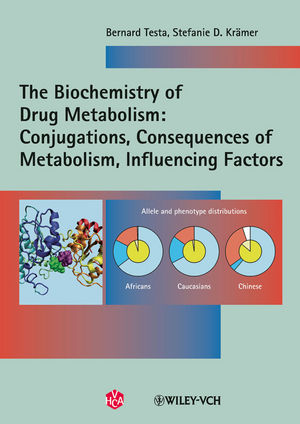The Biochemistry of Drug Metabolism: Volume 2: Conjugations, Consequences of Metabolism, Influencing FactorsISBN: 978-3-90639-054-3
Paperback
620 pages
April 2010
 |
||||||
Volume Two contains the last four parts of this work. Part 4 is devoted to the huge field of conjugation reactions, with much information being given on transferases. As in the two preceding parts, each drug-metabolizing enzyme or enzyme family begins with an Enzyme Identity Card summarizing its nomenclature and biochemical essentials. The reactions examined here include methylation, sulfation, glucuronidation, acetylation, conjugation with glutathione, while there is also a rigorous presentation of the pivotal role of xenobiotic-coenzyme A conjugates as a crossroads to various metabolic reactions.
The next part examines the consequences of drug and xenobiotic metabolism in a pharmacological and toxicological perspective, with due attention paid to full activation, as is found with prodrugs, and to the worrying case of xenobiotic toxification.
Parts 6 and 7 cover the inter-individual and intra-individual factors that influence drug metabolism, starting with an introduction to evolutionary events leading to species differences in the metabolism of xenobiotics and to polymorphisms within a particular species. Focusing on humans, the most relevant polymorphic drug-metabolizing enzymes are discussed, concentrating on ethnic differences and on the consequences for the pharmacokinetic behavior of affected drugs, while also introducing sex-dependent metabolic reactions.
The final part introduces the mechanisms leading to increases or decreases in enzyme activities as the concept of enzyme induction via nuclear receptors and the different mechanisms of enzyme inhibition are explained. With these basics in mind, various influencing factors are discussed, including physiological and pathological conditions, as well as drugs, nutrients and environmental agents with a special focus on drug-drug interactions.
With a foreword by Prof Leslie Z. Benet -- the best and best-known biopharmaceutical scientist worldwide.
The next part examines the consequences of drug and xenobiotic metabolism in a pharmacological and toxicological perspective, with due attention paid to full activation, as is found with prodrugs, and to the worrying case of xenobiotic toxification.
Parts 6 and 7 cover the inter-individual and intra-individual factors that influence drug metabolism, starting with an introduction to evolutionary events leading to species differences in the metabolism of xenobiotics and to polymorphisms within a particular species. Focusing on humans, the most relevant polymorphic drug-metabolizing enzymes are discussed, concentrating on ethnic differences and on the consequences for the pharmacokinetic behavior of affected drugs, while also introducing sex-dependent metabolic reactions.
The final part introduces the mechanisms leading to increases or decreases in enzyme activities as the concept of enzyme induction via nuclear receptors and the different mechanisms of enzyme inhibition are explained. With these basics in mind, various influencing factors are discussed, including physiological and pathological conditions, as well as drugs, nutrients and environmental agents with a special focus on drug-drug interactions.
With a foreword by Prof Leslie Z. Benet -- the best and best-known biopharmaceutical scientist worldwide.



